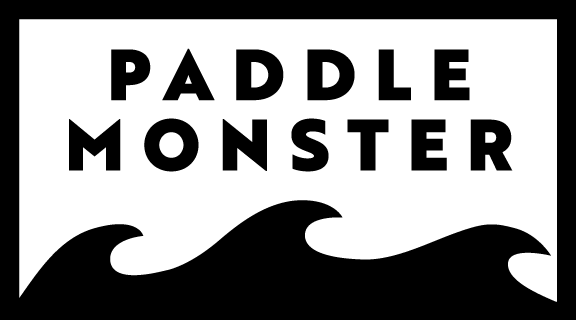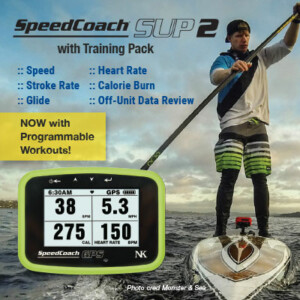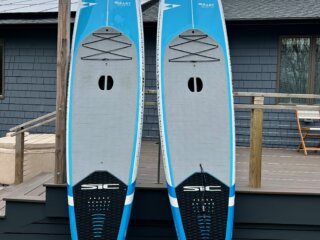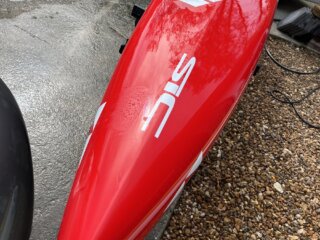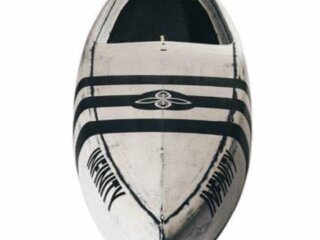
SUP Paddling Safely Means not Getting in Over Your Head
There is a fine line between pushing your limits as a paddler and knowing when you might be in over your head. That line can be crossed in many different scenarios - maybe it's going out in conditions other than what you are used to, or paddling in bigger waves, or participating in a race that might require conditioning and/or skills that you just don't have. And it's not limited to beginners - even intermediate and advanced paddlers can find themselves at risk, or at the very least, in emergency situations requiring calm yet fast thinking, either to help themselves or others.
If we want to improve, we definitely need to challenge ourselves, but there are ways to accomplish that goal and promote paddle progression safely, regardless of the type of paddling we are doing.
Know your limits and be honest about them
Outdoor instructors will tell you that it's not always the beginners who are the most risky, but the intermediate or advanced students who think they know enough because they've been doing a given activity for a while. Everyone, no matter what their experience and skill level needs know their limits and paddle within them. It's easy to get excited about a new paddling challenge, and ignore the risks involved or the fact that it might be too far above your skill level.
It's also easy to be goaded into doing something that you are simply just not ready for - whether because of peer pressure or perceived peer pressure, or FOMO- Fear of Being Left Out. But the smartest paddler is the one who knows to check the ego on the beach, dock or start line and simply say, "No, not today." There is no shame in that. Knowing your limits, being not only honest but also accepting of them is a trait we should all admire and cultivate. In ourselves and in others. Stepping back and acknowledging that an injury, illness or lack of experience might mean sitting out a race or a paddle in different, more difficult conditions can save further injury, prolonged illness or a necessary rescue. Or worse. Keeping expectations in check and understanding that there is indeed a progression, a "working up" to being able to catch larger waves, downwind in heavier conditions or paddle greater distances is extremely important.

Use the Buddy System
When pushing yourself in challenging situations, having a more experienced and locally knowledgeable buddy is a great way to make sure you get the most out of your session. You will learn more, likely have more confidence and be willing to push harder knowing you're with someone who understands the conditions and the area where you are paddling. The value of having someone to help in the event of an emergency goes without saying.
If you agree to be someone's buddy, then honor that agreement. Don't assume that it's okay to leave them behind or out of sight. Be able to reach them quickly in the event they need help or conditions change. In the SCUBA world, there's a phrase that's applied to divers who believe you're someone's buddy as long as you are both in the same ocean on the same day - it's called Same Ocean Buddy. Same Ocean Buddies jump in the water with you and then do their own thing. It's frowned upon underwater and it should be above it as well. Don't be an SOB.
If you can't find a buddy, at the very least, let someone know where you are going, how long you will be out and use one of the many devices to help locate you in an emergency. If paddling alone, using safety gear like leashes and lifejackets is paramount.
Be as prepared as possible-physically, intellectually and mentally
Most of the time, we have a pretty good sense of what kinds of situations we can't handle physically, especially when we are beginners. But as we progress as paddlers and gain more confidence, some times we can lose sight of the fact that certain conditions might require more out of our bodies, and our minds. Paddling in higher winds, stronger current or bigger waves generally requires more strength and endurance - that's obvious, right? But a lot of the time, it takes more than just being able to power yourself out of heavy conditions, especially if they come up quickly and take you off guard. That's where having local knowledge, and an understanding of how water, wind, tide and current behave in any given location is so important.
Do not assume that just because conditions are generally one way on the lake where you paddle or the ocean, for that matter, means they will be the same somewhere else. And don't assume a weather, wind, or surf report is accurate and updated and static. Land masses, prevailing winds, meteorological conditions and oceanographic influences are different almost everywhere! Condition forecasts are not set in stone. Open oceans are markedly different than protected bays. Rivers are different than lakes. You get the idea. Prepare for paddling in a new place by doing research, talking to the paddlers who live there, and then TAKE THEIR ADVICE. Doing that, along with preparing yourself with physical training goes a long way in making sure you don't get into trouble.
Part and parcel with that is cultivating situational awareness of what's going on around us every time we are on the water, no matter where we paddle. It's especially important when we're in new water. Look around, pay attention to what's happening around you. Lawrence Gonzalez in his excellent book, Deep Survival: Who Lives and Who Dies and Why explains that "inattentional blindness" - also called perceptual blindness - can prevent us from seeing the "forest from the trees" as it were, causing us to miss obvious yet unexpected objects or stimuli that can put us in bad situations. It can occur when we are too focused on one singular thing that we ignore everything else that may be going on around us. It can also occur when when have a perception or expectation of things being a certain way - ie: expecting a current condition report as being correct and unchanging. As paddlers, we can help prevent this by learning to read the water, by learning to read the signs that a storm is coming, or a shift in the wind. It might sound like this would detract from the experience of paddling, but it can be part of the fun, part of the challenge. You might even be surprised at the things you will see and notice! And it will become second nature, making you a much better paddler. And a safer one.
Being prepared intellectually also means thinking about worst case scenarios ahead of time and planning how you will respond to them, should the need arise. One great way to get in the habit of doing this is to take a wilderness or water survival class or even a wilderness first aid course, where this kind of risk management is usually taught. Take any class or clinic, for that matter, even if it's not safety related. The more you know, the better off you will be. Even practicing rescue techniques, including how to inflate and don your inflatable pfd, if that's what you use, can be very, very helpful and enlightening.

Mind the Little Things
There's lots of documentation in the outdoor risk management world about how accidents rarely are the result of just one thing that goes awry. It's usually a cascade of little things that go wrong that ultimately combine to make an emergency situation. So don't ignore that leash string that might look a little dry rotted, or the fact you left your hydration bladder at home. Or the sudden change in weather, or the low battery warning on your cell phone. Any time that little voice inside your head says, " Gee, I wonder if I should be concerned about X - naw, it'll be alright" stop and think again.
Accidents and incidents on the water are always likely to occur. We accept that risk every time we paddle out. But that doesn't mean we should be reckless and ignore the things that can make each session safe and ultimately more fun for everyone.
Additional Reading:
https://paddlemonster.com/explore-stand-up-paddleboarding/the-importance-of-learning-ocean-paddling-skills/
https://paddlemonster.com/explore-stand-up-paddleboarding/blown-a-mile-offshore-what-would-you-do/
https://paddlemonster.com/how-to-stand-up-paddleboard/sup-downwinding-checklist-catching-bumps-and-staying-safe/
https://paddlemonster.com/how-to-stand-up-paddleboard/paddling-awareness-understand-the-risks-of-standup-paddling/
https://paddlemonster.com/explore-stand-up-paddleboarding/explore-stand-up-paddleboarding-sup/knowing-when-its-okay-to-go-paddling-how-to-improve-your-skills-safely/
Paddle Events
DeSatnick Foundation Around the Cape Paddle
Ohio River Paddlefest Races
The Circumnavigation-Tilghman Island 2024
Recent Classifieds
2 Boards: Both SIC Bullet 12’6″ x 28.5″
- Sell
- 3 days ago
- Stand Up Paddleboard
- 02813 Charlestown , Rhode Island United States
- 57 views
SIC XRS 14 x 22
- Sell
- 6 days ago
- Stand Up Paddleboard
- Chattanooga , Tennessee United States
- 88 views
Wanted! Ocean / downwind 14 foot SUP
- Buy
- 7 days ago
- Stand Up Paddleboard
- Main Street , 07005 Boonton , New Jersey United States
- 86 views
one edge pro 2.0 hollow 14′ x 23.5”
- Sell
- 1 week ago
- Stand Up Paddleboard
- 53066 Oconomowoc , Wisconsin United States
- 115 views
2021 Starboard Allstar 14×24 5
- Sell
- 1 week ago
- Stand Up Paddleboard
- 21085 Joppatowne , Maryland United States
- 100 views
Subscribe for Premium Content and Coaching
Join the Paddle Monster paid Plan Today!
You May Also Like


The Island Paddler: How (and Why) I Became a Voyager

